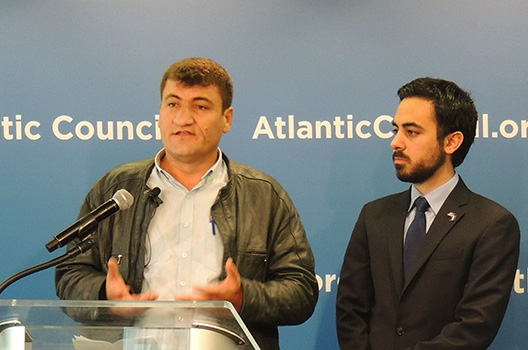 On November 6, 2015 the Atlantic Council’s Rafik Hariri Center for the Middle East hosted renowned media activist and civil society leader Mr. Raed Fares. Mr. Fares founded the Union of Revolutionary Bureaus, which provides services to over one million Syrians including running water and an FM radio station. He is well-known for the witty anti-Assad banners of his hometown Kafranbel that are often directed at Western audiences. Hariri Center Senior Fellow Frederic C. Hof provided introductory remarks and Fellow Faysal Itani moderated the discussion.
On November 6, 2015 the Atlantic Council’s Rafik Hariri Center for the Middle East hosted renowned media activist and civil society leader Mr. Raed Fares. Mr. Fares founded the Union of Revolutionary Bureaus, which provides services to over one million Syrians including running water and an FM radio station. He is well-known for the witty anti-Assad banners of his hometown Kafranbel that are often directed at Western audiences. Hariri Center Senior Fellow Frederic C. Hof provided introductory remarks and Fellow Faysal Itani moderated the discussion.
Mr. Fares began his remarks with a brief history of the Syrian revolution. He explained how before the revolution, the Syrian people were not living with freedom and in spring 2011 the Syrian people revolted against their grievances with words – displaying banners and signs. For the first seven to eight months, the opposition was nonviolent. However, in time groups of people defected from the Syrian army and turned to arms. Mr. Fares emphasized though these armed groups did not in fact represent the revolution.
Mr. Fares explained that approximately two years into the revolution, al-Qaeda and other extremist groups began to also fight against the Syrian regime. These groups joined however not to protect the Syrian people but rather to have power. In this way, these extremist groups were no different from the regime itself; they too existed to control the Syrian people.
Throughout the revolution, groups had always tried to silence the voices of Syrian civil society. The Assad regime had once burnt down and twice targeted with barrel bombs the Union of Revolutionary Bureaus offices. Similarly in 2013 the Islamic State (ISIS or ISIL) attacked the office, destroyed its equipment, and abducted six activists working there. One month later, ISIS attempted to assassinate Mr. Fares. Since, al-Qaeda also twice attacked Mr. Fares with improvised explosive devices and twice abducted him; Jund al-Aqsa has once abducted him.
Notwithstanding the repeated attacks, Mr. Fares and his fellow activists have demonstrated that they are so deeply rooted in society with the work they have done that the extremists and the regime cannot eliminate them. The Union of Revolutionary Bureaus has conducted extensive humanitarian relief, development, and media projects with minimal support. Mr. Fares and his organization has found creative and productive ways to support Syrian civil society and the revolution amidst great challenges.
